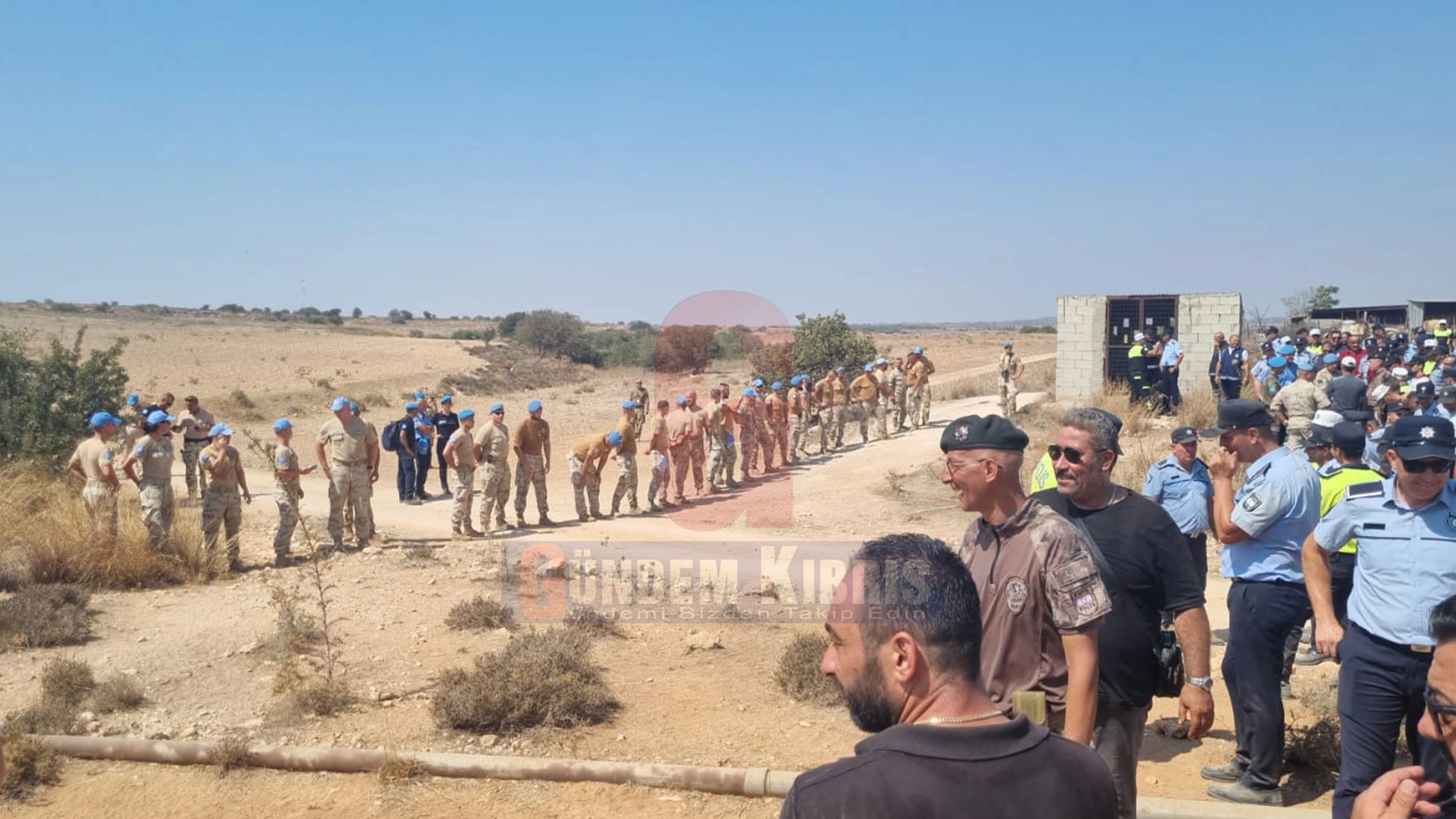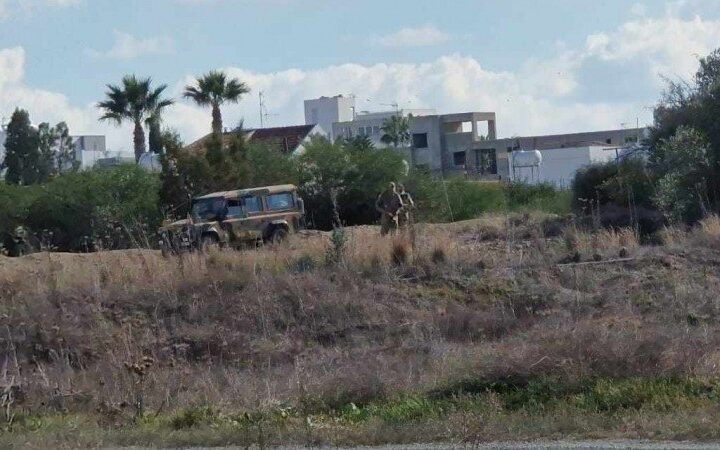Mesut Hakkı Caşın, the Turkish president’s advisor on security and foreign policy, indirectly hinted at the possibility of harm to UN troops in Cyprus should they infringe upon what he termed the sovereignty of breakaway Turkish Cyprus.
He also claimed that the entire Mediterranean belonged to the Turks.
On August 19, appearing on the pro-government CNN Turk channel, Caşın, a former soldier and member of the Presidential Board for Security and Foreign Policy, declared, “The Turkish nation stands firmly with the Turkish Cypriots.
The Mediterranean Sea belongs to us, and no one should even think about raising a sword against us there. They [Greece, Cyprus, and their allies] better not forget this.”
He additionally asserted that the United Nations Peacekeeping Force in Cyprus (UNFICYP) had abandoned its neutral stance and is now acting in accordance with directives from the Greek Cypriots.
He accused UN troops of committing a serious offence by infringing on the sovereignty of the ‘Turkish Republic of Northern Cyprus (KKTC),’ a breakaway state recognised only by Turkey.
He further claimed that Turkish troops and police were acting in self-defence when they took action against UN troops, removed concrete barriers, and pushed UN vehicles to the side of the road. Caşın made clear that Turkey would not forget hostilities directed against it.
In an implied warning of potential deadly retaliation against UN troops, Caşın referenced the 1996 incident within the buffer zone that separates Cyprus’s Turkish and Greek sections.
During a confrontation at the border, a Greek Cypriot man named Tassos Isaac was fatally beaten.
The clash occurred when Greek Cypriot protesters confronted Turks and Turkish Cypriots.
A day later, following Isaac’s funeral, another Greek Cypriot man named Solomos Solomou was fatally shot during a demonstration.
Solomou was attempting to climb a flagpole to remove a Turkish flag.
“You will recall, a man tried to bring down the [Turkish] flag, and you remember what happened to him,” Caşın said.
Meanwhile, Erhan Arıklı, sought by Cyprus for his suspected involvement in the murder of Isaac and Solomou and facing an Interpol arrest warrant, currently holds a position as a cabinet minister in the KKTC coalition government.
He oversees the economy and energy portfolios.
Arıklı was apprehended under an Interpol Red Notice on September 18, 2012, but was subsequently released. He is the leader of the right-wing Rebirth Party (YDP) in the Turkish Cypriot region of the island.
Caşın’s comments were made in the context of ongoing construction work on the Pyla-Arsos road initiated by the Turkish Cypriot side on August 17 within the UN buffer zone.
This development led to a confrontation between UN forces and Turkish Cypriots a day later, resulting in the injury of four peacekeepers.
There was subsequently a wave of condemnation from the UN Security Council, the European Union, and the United States.
“The members of the Security Council stressed that this action runs contrary to Security Council resolutions and constitutes a violation of the status quo in the United Nations buffer zone,” said in a statement issued by UN Security Council President Linda Thomas-Greenfield on August 21.
She also underlined that attacks against peacekeepers could potentially amount to crimes under international law.
The Security Council has called for removing all unauthorised construction and preventing any unauthorised military or civilian activities within and along the ceasefire lines.
Turkey and Turkish Cypriots appear to have heeded this call, as the ongoing work has been halted.
On August 17, the Turkish Cypriot government’s foreign minister, Tahsin Ertuğruloğlu, formally informed the UN in a letter about the commencement of construction work.
This came after a series of discussions with the UN yielded no progress.
The letter stated that the construction was driven by a humanitarian need to provide easy and unrestricted access for Turkish Cypriot residents of Pyla to the territory of the ‘KKTC.’
However, observers believe that the Erdogan government is the driving force behind this abrupt action, without waiting for the outcome of talks with the UN and the Greek Cypriot government.
Distraction
Under mounting pressure from domestic financial and economic challenges, the Erdogan government seems to be in desperate need of a distraction, and Cyprus appears to be a convenient tool in their toolbox for this purpose.
Furthermore, some speculate that by intentionally creating a crisis in Cyprus, Erdogan aims to bolster his position in anticipated negotiations with the US and the EU with the hope of normalising Turkey’s troubled ties with the West and attracting investment and trade.
In his interview, Caşın also mocked the UN troops, saying they had experienced “brain trauma” because of rising temperatures in Cyprus.
“[Extreme hot weather in Cyprus] causes brain trauma in UN soldiers. The Turkish military taught UN commanders about the trauma experience.”
He said the force would be used if UN troops failed to heed Turkey’s demands and threatened to administer the notorious “Ottoman slap,” a reference to resorting to force.
The president’s aide also characterised the increased US military presence in neighbouring Greece as a perceived threat to Turkey.
He alleged that recent joint military exercises conducted by the US and Greek militaries, including wartime river crossing manoeuvres, signalled an intention to potentially occupy Thrace in the future.
He identified the Biden administration as the orchestrator, referring to it as the “higher mind” behind a supposed plan to rally the Turkish and Greek populations against the Erdogan government.
“The balance of military power is being disrupted in the Aegean and Mediterranean.
“The US lifts the embargo on the Greek Cypriot side and gives new weapons to Greece … The US gives Greece F-16s and F-35s.
“They [the Greeks] receive new ships, tanks, thousands of armoured combat vehicles, ports. They turn Dedeagac [Alexandroupolis], Crete and finally, the islands of Limni [Lemnos] and Iskiri (Skiros) into American bases contrary to the Lausanne Treaty.
“Lastly, there is an ongoing military exercise taking place on the Karasu River, focusing on river crossing operations.
“Therefore, if Turkey and Greece were to engage in conflict, American soldiers are allegedly preparing to cross the Evros and jointly invade Turkey’s Thrace region along with the Greeks,” he added.
Erdogan’s aide also criticised retired US Navy admiral James Stavridis, accusing him of plotting against Turkey through military exercises he helped plan in the Aegean and Mediterranean regions.
He likened Stavridis’s head to an istavrit fish (horse mackerel) and stated, “There’s this man named Stavridis, a retired admiral whose head resembles an istavrit fish.
“He has been organising exercises on land, sea and air in the Aegean and eastern Mediterranean for the past decade.”
Despite all these actions purportedly aimed at his country, Caşın expressed his belief that Turkey possesses the strength to overcome these challenges.
He asserted that a project known as “Turkey’s Century,” an election campaign promise made by President Erdogan to elevate Turkey to global prominence, would be accomplished, nonetheless.
As of December 2022, the UN maintained a presence of 797 military personnel and 68 police officers in Cyprus, as reported to the Security Council in January.
The majority of these personnel are from Argentina. The annual cost of maintaining this peacekeeping force is $54 mln.
On average, the UN mission handles approximately 10 incidents in and around the buffer zone every 24 hours, as reported by the UN secretary-general.
As noted by the UN, the situation is compounded by the lack of common ground between the parties concerning peace talks and the absence of prospects for a mutually agreeable solution.
The UN report assigns blame to both sides for unauthorised construction within the buffer zone, which disrupts the status quo by effectively occupying areas originally designated as a security buffer between opposing forces.
UN Secretary-General António Guterres said, “Encroachment by both sides into the buffer zone, primarily in the form of unauthorised construction but also occasional military incursions, continues to be a major source of tensions, particularly when distorted and amplified by disinformation.”
This article written by Abdullah Bozkurt first appeared in Nordic Monitor, of which he is Executive Director










